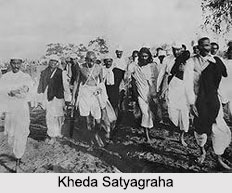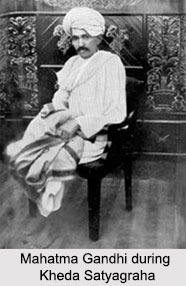Introduction
 Kheda Satyagraha of 1918 was an Indian Freedom Struggle movement by Mahatma Gandhi at Kheda district, Gujarat. It was a very successful movement to support peasants of the Kheda. People of Kheda were unable to pay the high taxes levied by the British due to crop failure and a plague epidemic. Mahatma Gandhi wanted people to protest against the British government, thus arranged for meetings, debated and discussion to make people aware about the need for a free country. Kheda Satyagraha was the third Satyagraha Movement after Champaran Satyagraha and Ahmedabad Mill Strike.
Kheda Satyagraha of 1918 was an Indian Freedom Struggle movement by Mahatma Gandhi at Kheda district, Gujarat. It was a very successful movement to support peasants of the Kheda. People of Kheda were unable to pay the high taxes levied by the British due to crop failure and a plague epidemic. Mahatma Gandhi wanted people to protest against the British government, thus arranged for meetings, debated and discussion to make people aware about the need for a free country. Kheda Satyagraha was the third Satyagraha Movement after Champaran Satyagraha and Ahmedabad Mill Strike.
Associates of Kheda Satyagraha
In the state of Gujarat, Mahatma Gandhi was the spiritual head and the nationalist head. Hence he, along with his followers, organized mass movements from the state. Sardar Vallabhbhai Patel was the main person with Gandhiji in the movement of Kheda Satyagraha. Other devoted followers were Indulal Yagnik, Shankarlal Banker, Mahadev Desai, Narhari Parikh, Mohanlal Pandya and Ravi Shankar Vyas worked towards the movement at Kheda. Many aroused Gujaratis from the cities of Ahmedabad and Vadodara joined the organizers of the revolt, but Mahatma Gandhi and Sardar Vallabhbhai Patel resisted the involvement of Indians from other provinces, seeking to keep it a purely Gujarati struggle.
Importance of Kheda Satyagraha
The revolt of Kheda Satyagraha was path breaking in terms of unity and discipline. Even when all their personal property, livelihood and land were taken away, a major part of the farmers at Kheda remained firmly united in support of Sardar Vallabhbhai Patel. The Gujarati people in colonial era, in other parts, who were active supporters of the revolt, lambasted the government machinery and also helped to shelter the relatives and property of the protesting peasants. Although nationalists like Sardul Singh Caveeshar called for sympathetic revolts in other parts, Mahatma Gandhi and Sardar Vallabhbhai Patel firmly rejected the idea.
Success of Kheda Satyagraha
Finally, the British Government in India required fostering an honourable accord for both parties. The tax for the year in question, and the next was be suspended, and the increase in rate reduced, while all confiscated property was returned. People also worked in unity to return the removed lands to their rightful proprietors. The ones who had bought the lands detained were swayed to return them, even though the British Empire in India had officially said it would stand by the buyers. The greatest successes of the movement were that it remained non-violent, peasants got apprised about their rights, and the community stood firm on the plea for a cancellation of taxes that year.
Struggle of Kheda Satyagraha
 Sardar Vallabhbhai Patel along with his fellow workers organized essential tax revolts with various caste and ethnic communities of Kheda. The farmers, peasants and lower class people of Kheda in the wake of famine, signed a petition calling for tax for current year to be scrapped in. The charter was rejected by the Government of Mumbai, who, in turn warned that if the Government did not receive revenue, then the property and land would be confiscated and people would be arrested. And once the land is taken away it will not be given back. None of the villages flinched.
Sardar Vallabhbhai Patel along with his fellow workers organized essential tax revolts with various caste and ethnic communities of Kheda. The farmers, peasants and lower class people of Kheda in the wake of famine, signed a petition calling for tax for current year to be scrapped in. The charter was rejected by the Government of Mumbai, who, in turn warned that if the Government did not receive revenue, then the property and land would be confiscated and people would be arrested. And once the land is taken away it will not be given back. None of the villages flinched.
The tax withheld, the collectors and inspectors of the British Government of India sent thugs to seize the cattle, land and property. The arrest was not resisted by the farmers; no one retaliated to the force and might of the governmental violence. Instead, they used their cash and valuables to donate to the Gujarat Sabha which was officially organizing the protest.



















